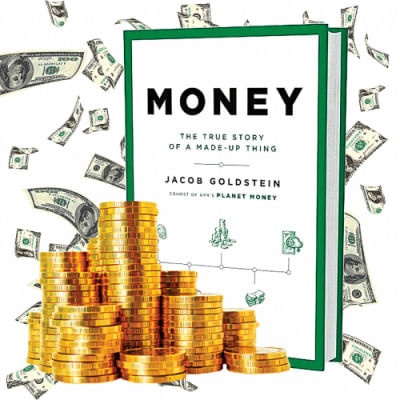Money Still Makes the World Go Round

I
Jacob Goldstein, author of Money: The True Story of a Made-Up Thing (Hachette Books, 2020), and the co-host of the radio podcast, Planet Money of npr.org, isn't an economist. He completed a Master's in creative writing from Concordia University. He slowly found his way reporting on stock markets during the financial crash of 2008. That is when he started asking the question: what is money?
A few weeks after the 2008 financial crash, Goldstein had dinner with his Aunt Janet, a business graduate who was a poet in her younger days. "Money is fiction. It was never there in the first place." Aunt Janet's response to the financial crash was the eureka moment for Goldstein. Twelve years later, Goldstein narrates a story of the history of money.
The book is based on two central and recurring themes. First, that money is a 'shared fiction'. We all accept it and value it. "Otherwise, it's just a chunk of metal, or a piece of paper, or, … a number stored on a bank's computers". Second, the history of money hasn't been linear. Out of necessity, or due to some unexpected accident, money has changed form over time.
II
Before money, people exchanged through barter. Barter works well in communities where members are aware of each other's needs, and where everybody has the necessary skills to produce what others need.
With the formation of cities in Mesopotamia, a 'shared fiction' of a medium of exchange was needed. This is where the story begins with Babylonians using clay tokens as an accepted medium of exchange to clear debts. Goldstein sets the stage in Greece, where coins and metal money took off.
III
As he seeks to find how money changed over time, Goldstein dramatizes events and explores how they influenced societies.
Paper money was invented in China by a merchant in Sichuan around 995 AD. This freed people from carrying and storing heavy metal coins. The effect was explosive. By the 13th century, China became the most prosperous country in the world.
However, hyperinflation during the Ming dynasty led to China reverting back to metal coins. China became the 'sleeping giant' Napoleon was to 'coin' centuries later.
The Mongols introduced paper money to run their empire and facilitate trade. All of a sudden, paper money became 'shared fiction' for different cultures and regions. This had an explosive effect on trade and what would today be termed as 'globalisation'.
Goldstein then jumps directly to renaissance Europe, bypassing the Arabs. He delves into the historical events that lead to the creation of stock markets, central banks, and Europe's adoption of paper money.
The Great Depression of the 1930s was a turning point. Roosevelt took the US off the Gold Standard. Whether by accident or by design, the US Dollar slowly became the global legal tender after World War II.
Goldstein shows how panic during the 2008 crash lead to the collapse of a financial system. States ended up bailing out big corporations. Looking into the future, Goldstein finishes the book with bitcoin, and modern monetary theory.
IV
Goldstein's exploration of history bears traits of Ibn Khaldun's Al Muqaddimah. It looks at history objectively. His 'shared fiction' hypothesis rings bells of Yuval Harari's Sapiens in its ability to accept and believe 'shared myths'. Once the trust of the 'shared fiction' of money breaks, societies find a new 'shared fiction'.
Books on economic history should be written like this. Whatever one's back ground, Goldstein has an uncanny ability to blend facts with humour and wit, leaving the reader to pause, think, and move on.
Asrar Chowdhury teaches at the Department of Economics at Jahangirnagar University. Email: [email protected]

 For all latest news, follow The Daily Star's Google News channel.
For all latest news, follow The Daily Star's Google News channel. 



Comments